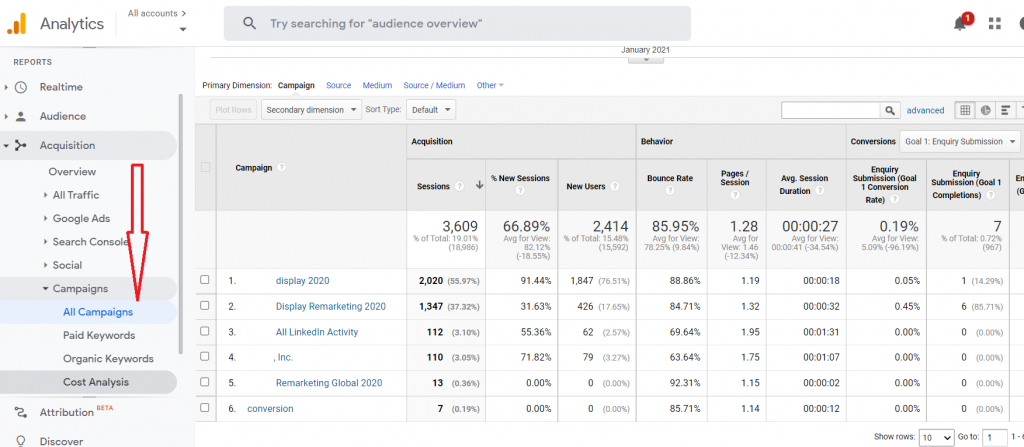How To Use UTM Tags And Event Tracking For Better Decision Making
You may be familiar with Google Analytics and HubSpot analytics tools, which marketers use to track data. However, you might not know that they use two different methods for monitoring links on a website: UTM tags to measure external link acquisition (what people do when clicking on your ads) and Event Tracking to measure internal web traffic activity such as video views or form fills.
Quick Links
If you’re looking to make better decisions for your marketing campaigns, it’s essential to know what is working and what isn’t. One of the easiest ways to track this is with UTM tags and Event tracking codes. In this blog post, we will cover how to use event tracking in Google Analytics so that you can see which social media posts are driving traffic back into your website. We’ll also discuss how UTMs help provide insights on campaign performance and conversions!
UTM Tags are Used for External Sources
According to the SEO company in Gurgaon you should keep in mind when using UTM tags that if you use them on internal links, they will override the original destination and referrer source. This is why it’s important to only apply these codes to external domains, not your own website’s pages.
Only use UTMs (URL tracking) with outside sources like Facebook and Twitter by default because applying this code externally won’t affect any of our analytics metrics or cause significant problems with how we track data internally since there are no other URLs/links associated with those destinations linking back into our system.
Does this mean the UTM tag should not be used on your website?
No! You can create links to other sites with them. That way, if the link goes to an outside domain, that’s fine because it becomes external and will still provide Google Analytics data for both domains when someone clicks through from one site to another.
To track click-throughs back onto your domain, though (and collect valuable analytics), make sure each point in the chain is also using event tracking or adding their tags, so they’re getting credit for those visitors too.
If you have an external link on your website, you can track it using both a UTM tag and an Event?
If you want to track links on your website from other websites, use UTM tags and events. You’ll need an event that tracks the click under Behavior (on your site) as well as a UTM tag for Acquisition (at the link’s destination). It can be confusing when or if it is appropriate to add these tags, so make sure not to do anything without first reviewing our tips!
If you like using external links in your content but aren’t always sure how best to ensure they’re tracked correctly after clicking them, then have no fear because we’ve got just what you need. Set up with Event Tracking and Google Analytics Universal Tracker will automatically send data back about clicks into a specific behavior page of yours where users took certain actions.
UTM Tags are used to Track Campaign Efforts
Marketers are always looking for new ways to track their marketing campaigns. UTM tags provide a robust method of tracking campaign performance across various networks like email, social media posts, and paid ads, as they can be added to the links in these platforms. Dallas SEO expert use UTM codes on content sharing websites when they perform link building SEO activities, to find out which article content is referring more traffic to their website. With this information at hand, marketers will now have insight into which pieces work well with their audiences on different mediums that would not otherwise be available without them being tagged. This helps determine what is working and should henceforth continue doing so!
Steps to Develop UTM Codes in Google Analytics
Open Google’s campaign URL builder and complete the link attribute in the form. You will see the UTM builder page as shown below. Next, fill in the website URL, Campaign Source, Campaign Medium, and other relevant information.

Next, use your marketing campaign link, which you can shorten using link shorteners such as this.
The last step is to measure your success, as Google will help track incoming campaigns.

Finally, your custom tracking codes will be set up and working effectively for your marketing campaigns.
How does Google Analytics Event Tracking work?
A custom code snippet is embedded in the link code on the items you choose to track such that when clicked, the element gets tracked and shows as a Google Analytics event.
The Event tracking code has four parts that will help to create user’s interaction on your website:
- Category (Required): This entails the name assigned to various objects you intend to track.
- Action (Required): This involves interaction types such as document download.
- Label (Optional): This helps summarize what the Event involves, such as navigation menu clicks.
- Value (Optional): If you intend to assign numeric values to your document download, you should consider value.
When the event fires on your site, all you need to do is provide them with a name and let Google Analytics track it. As mentioned above, naming conventions are important for those values to show up correctly within Universal Analytics. The most common way of tracking events using this code: onclick=”ga(‘send’, ‘event’, ‘Category’,’Action’,’Label’ ,'”Value” );”
You should place the code in front of the href link text as illustrated below:
<a href=” www.samplesite.co.uk/company_onboarding.pdf” onclick=” ga(‘send’, ‘event’, ‘Category’, ‘Action’, ‘Label’, ‘Value’);”>
You can replace the four elements (category, action, label, and value) with the values you choose to enter.
Event Tracking And UTM Tracking: How Are They Different?
Internal: Event Tracking
Event tracking can be a powerful tool for gathering information about your website. It is generally best used on links meant to send users back within the site, but it can also be helpful if you have an external campaign running. Event tracking works by adding code onto any link and triggering an event every time someone clicks or taps their mouse cursor over it. This causes one line of data to be passed back into Google Analytics which helps identify where people are coming from more precisely, so we know what marketing strategies work better than others!
Event Tracking can include:
- Promotional links
- Internal banners
- Videos
- Buttons (Phone no., email)
- Forms
External: UTM Tracking
Imagine if you could track every click on your website. You can use the UTM tracking tool to do just that! This powerful Google Analytics feature is perfect for campaigns running outside of our site. Also, it provides data into what works best with audiences when it comes down to content marketing efforts.
The URL builder will help us create a new link, which requires including three crucial pieces: source (Google or Facebook), medium (or channel), and campaign name, plus additional optional parameters like ad content/keyword, so you know who’s clicking through and from where. All this information feeds directly back into your account in real-time and gives insights into how people use different types of media based on their channels.
UTM tracking is used for:
- PPC advertising
- Email marketing
- Comparison shopping ads
- Retargeting campaigns
- Banner ads on external sites
UTM Tags vs. Events: Which is better?
In the end, it’s up to you. UTM tags understand your website and how people find it outside of that source (like from an ad), but events help us understand what users do on our site and where they go when not browsing around. Both have their uses, so decide which will be best based on your needs!
Why WooCommerce is the Best Choice for Your Online Store?
WooCommerce stands out as a top option for anyone looking to build an online store. This platform…
0 Comments8 Minutes
How to Use AI-Powered SEO Tools for WordPress eCommerce
SEO is a critical factor in the success of any e-commerce WordPress store. As competition…
0 Comments11 Minutes
Why Short-Form Videos Are the Future of Content Marketing
Your Instagram customers spend over 50% of their time watching short-form videos and reels. Rather…
0 Comments12 Minutes
The Role of Digital Marketing in Business Growth
Online marketing touches every aspect of a business, whether it is initiating the idea or for an…
0 Comments3 Minutes
AI Meets Authenticity: Balancing Automation and Human Touch in Content Marketing
Is your brand starting to sound like a robot? In a world where algorithms write faster than any…
0 Comments8 Minutes
Essential Tools for Enhancing Web Design and UX Hosting
Have you ever visited a website that felt slow, clunky, or confusing? A website that is poorly…
0 Comments11 Minutes
How a Mini Cart Transformed My Store’s Shopping Experience
Okay, real talk—running an online store is hard. You think you’ve got everything figured out, you…
0 Comments9 Minutes
Balancing Your Security Initiatives With Industry Compliance Requirements
Managing a business today comes with a number of daily battles that need to be fought. Resources…
0 Comments11 Minutes








